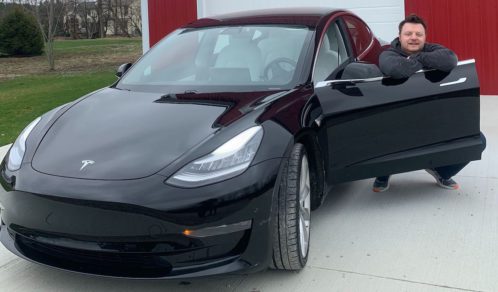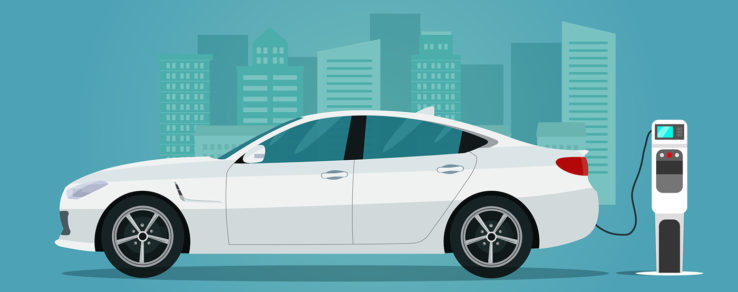Launched in 2008, Tesla’s battery-electric vehicles continue to take the industry by storm. The cutting-edge technology was first introduced with the Model S, which, according to Tesla, “has become the best car in its class in every category.” It boasts the longest range of any electric vehicle, 0 to 60 mph acceleration in 2.28 seconds and over-the-air software updates.
Are all of these impressive features worth the purchase prices? Questline Digital’s own Jeremy Harning, Senior Director of Software, purchased a Tesla in December 2018. Having a little over a year in the driver’s seat, Questline Digital sat down with him to hear his honest review of the vehicle.

When did you decide you wanted to purchase a Tesla?
I would say it was shortly after the Model 3 came out. I always admired the car, but I didn’t really have enough money for a Model S. When the Model 3 came out it was at least close to the ballpark of what I wanted to spend on a car. And there was about a $7,500 tax credit, which is basically like someone giving you that money to buy the car.
What led you to decide you wanted to own a Tesla? What did you admire?
Definitely environmental (reasons). I’m a big proponent that we need to get off fossil fuels for a lot of reasons. (Now) I could get this energy from a clean source, whereas before, with a gas-powered car, I couldn’t do that. That’s step one — to get us off of fossil fuels we have to stop driving around these cars that can only burn fossil fuels.
The other thing is a much more selfish reason — the performance value proposition. The car does 0 to 60 in three seconds. You have to spend serious, serious money to get into that kind of acceleration range for anything else. The first time you experience it you feel like you’re in a spaceship, not a car. So those things together kind of made it a no brainer for me.
Did you research the car before you went to a dealership?
Yeah. They actually don’t have dealerships, so you have to do a lot of research on your own. You can go to a showroom, but you can’t buy the car there — all the cars are bought online. Researching that, the tax credit, the likely cost reductions and the cost of ownership — those are all things I did prior to going to the showroom.
Was the showroom helpful in giving you new information?
Yes. It just helped clear up any questions I had about the process itself. I talked to them about wait time and how the car gets delivered and the options around leasing and buying and financing and all that. Then for me, personally, I wanted to sit in the car and see if my six-foot, five-inch body would fit in it. Being a very tall person, I wanted to make sure that the Model 3 wasn’t going to be too small for me.
What was the most surprising thing you learned about Tesla through your research and visit to the showroom?
When I started researching cost of ownership, I was surprised by how incredibly low it is. You don’t really understand that until you start doing the math, but there is literally no maintenance on the car besides tires and washer fluid.
When you start adding that up — and add in expected depreciation — you could buy a much cheaper car, but over the lifetime of that car you’re going to end up spending as much as you would on the Tesla. It actually compares to a Honda Civic as far as cost of ownership. The longer you own the (Tesla), the more that pays dividends because of the reduction in gas costs, the reduction in maintenance costs and then the high residual value the car maintains.
The lack of maintenance doesn’t even seem possible, and yet it is.
Yeah, people are most skeptical when you tell them you never have to replace the brakes, but the thing you learn when you drive the car is that you never use them. When you let off of the (acceleration) pedal, it turns the motors into chargers and the resistance of those spinning magnets slows you down at a very fast pace. So, you’re really only using the brakes when you have to stop quickly, which is a small percentage of all the driving you do.
Is there anything you wish you knew before purchasing it?
There are downsides. For one, if you live in a cold-weather climate, your range is drastically reduced when the temperature drops below 40 degrees. You’re talking probably 30% reduction from the range you can get in mild temps.
When you’re going on long trips, even though the car says you might get X number of miles, you have to keep an eye on it and watch what your energy consumption is, because if the battery gets cold as you’re driving it’s not nearly as effective.
Was range-anxiety ever a concern for you?
I would say it was and was not. I do most of my driving around town so I knew that if there was a problem, I could just use the other car, because we have a normal internal combustion car as well. For me, it wasn’t going to keep me from buying a Tesla.
I’ve actually taken it on several long trips since we bought it and Tesla’s charging network was specifically designed for long trips. They put them right next to the highway and put them at intervals that all their cars can handle, even in the winter. If I was going to drive from here to California, all along the way there are charging stops. The charging stations are integrated into the navigation computer so when you tell it that you’re going on a long trip it knows exactly when you’re going to need to stop, how long you’re going to need to stop, and how many spots are available at that stop at any given time.
Did working in the energy utility industry influence your decision to buy a Tesla?
Yes. This is technical, but for me, understanding how demand curves work and how much waste goes into keeping power lines tight between high peak and low peak demand. Basically, we waste a lot of energy trying to make sure that people’s power isn’t going to go out if they suddenly use more energy. The more we dump that “wasted” energy into storage, the less we have to burn or convert from other sources. That’s a big part of Tesla’s vision for the future. It’s a part of things that I’ve learned from working in the utility industry, so I think it definitely influenced my decision to purchase an electric vehicle.
How much did you spend on gas every month with your old vehicle compared to now?
I was spending a little over $160 a month, which is four $40 tanks of gas a month. Now I use roughly 900 kWh of energy per month on my car, which at the current rate is $126. So, I save about $40 a month in gas.
What are your favorite features of the car?
I would say the fact that the features are all configurable, which means they can constantly update and iterate on the car. Since I bought it, they’ve added — I can’t even count how many things it can do now that it couldn’t do before. And those just come at night, over the air, while I’m sleeping. You wake up and it says your car had an update, here are your new features. As a software developer, that’s just awesome.

